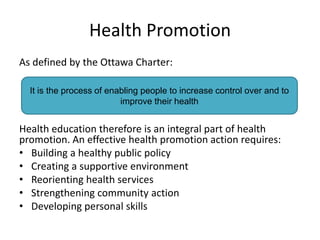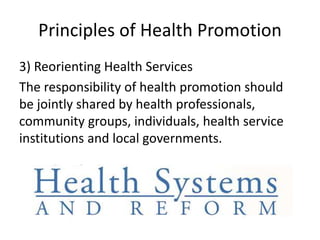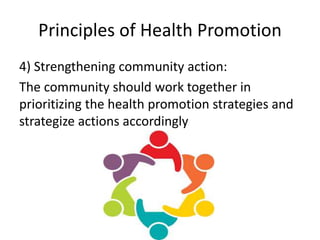Q. health education_.pptx
- 2. What is Health Education? Any form of education, with a positive impact on social, physical, emotional, environmental or value oriented aspects of an individual. This positive impact on an individual, results in favorable behavior change, leading to good health
- 3. What is Health Education? Through health education, people take steps (individual and collective) to protect, maintain and improve their own health. However, Health Education in Primary Health Care (PHC), aims to foster activities that encourage people to: • Want to be healthy • Know how to stay healthy • Do what they can, individually and collectively to maintain health • Seek help when needed
- 4. Health Promotion As defined by the Ottawa Charter: Health education therefore is an integral part of health promotion. An effective health promotion action requires: • Building a healthy public policy • Creating a supportive environment • Reorienting health services • Strengthening community action • Developing personal skills It is the process of enabling people to increase control over and to improve their health
- 5. Principles of Health Promotion 1) Building a Healthy Public Policy: The policy should identify the barriers to adoption of a healthy policy, include legislation, taxation, and all other measures leading to a consolidated effort to a healthy lifestyle.
- 6. Principles of Health Promotion 2) Creating a supportive environment: Addressing protection of natural resources and responding to the changing environment nationally and globally.
- 7. Principles of Health Promotion 3) Reorienting Health Services The responsibility of health promotion should be jointly shared by health professionals, community groups, individuals, health service institutions and local governments.
- 8. Principles of Health Promotion 4) Strengthening community action: The community should work together in prioritizing the health promotion strategies and strategize actions accordingly
- 9. Principles of Health Promotion 5) Developing personal skill No action can be successful without making personal lifestyle changes hence it requires acquisition of appropriate skills to make lifestyle changes.
- 10. Methods, Approaches And Media for I.E.C Information, Education And Communication
- 11. Methods, Approaches And Media for I.E.C Information, Education And Communication The Federal government is preparing a project for health education using the media. UNICEF will support the government health education programme. This will include, production of material and exchange of information such as workshops, seminars to sansitize policy/ decision makers and development of media messages for the education of general public
- 12. Definition I.E.C Initiatives: • Have a clear objective • Target a specific audience • Address a specific problem • Set a timeframe An approach which attempts to change or reinforce a set of behaviours in a target audience regarding a specific problem in a predefined period of time’ - Reproductive health and research, WHO
- 13. Health Promotion By I.E.C INFORMATION EDUCATION COMMUNICATION Target Audience Change in health behavior Promotion of health status
- 15. Objectives of I.E.C 1) To promote individual services and all other interventions of the project by creating demand, acceptance and adaptation among target groups 2) To bring about desirable behavioral changes in the household level maternal, child care and feeding practices 3) To mobilize community participation and support for various project activities 4) To empower the communities to plan and implement sustainable interventions to reduce malnutrition among adolescent girls, women and children and improve health and nutrition status of the community.
- 16. Fields of I.E.C • Primary Health Care • Prevention of disease • RCH • Family welfare • Nutritional Services • Personal hygiene
- 18. Definition A mechanism for the collection, processing, analysis and transmission of information required for organizing and operating health services, and also for research and training

















